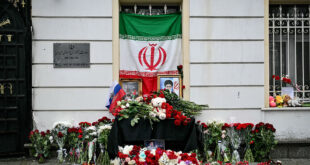 BAGHDAD – Six U.S. soldiers were killed on Wednesday when a house rigged with explosives blew up north of Baghdad during a new U.S.-Iraqi offensive targeting al Qaeda guerrillas in Iraq, the U.S. military said.
BAGHDAD – Six U.S. soldiers were killed on Wednesday when a house rigged with explosives blew up north of Baghdad during a new U.S.-Iraqi offensive targeting al Qaeda guerrillas in Iraq, the U.S. military said.
It was one of the highest daily death tolls for U.S. troops in Iraq for months and followed the deaths of three soldiers in the operation a day earlier. More than 3,900 U.S. soldiers have been killed in Iraq since the U.S.-led invasion in 2003.
The military gave few details of the incident but said the six soldiers were killed by a “house-borne improvised explosive device” during operations on Wednesday in Diyala, a volatile province north of Baghdad that is a hotbed of al Qaeda activity.
The three other soldiers were killed in Salahuddin province, also north of Baghdad, another target area of the new U.S.-led offensive against al Qaeda that was launched on Tuesday.
The commander of U.S. forces in northern Iraq, Major-General Mark Hertling told a news conference in Baghdad that 24,000 U.S. troops and 50,000 Iraqi army soldiers were participating in Operation Iron Harvest in four provinces north of the capital.
The operation is part of a wider offensive called Operation Phantom Phoenix, which U.S. commanders announced on Tuesday in Baghdad and its southern outskirts as well as the north.
Hertling said the main northern effort was in Diyala, an ethnically mixed and volatile area which he said al Qaeda considered the capital of its Islamic Caliphate.
A brigade of about 5,000 U.S. troops and a division of Iraqis had launched assaults near Muqdadiya in a fertile part of the Diyala River valley known as the bread basket.
Hertling said they had run into lighter opposition than they expected, with guerrillas apparently withdrawing from villages as the Americans advanced. He said Iraqi military reports that about 20-30 militants had been killed “sound about right”.
U.S. forces say al Qaeda Sunni Arab militants have regrouped in northern Diyala, Salahuddin and Nineveh provinces after being driven from western Anbar province and Baghdad.
“The people that left Anbar and Baghdad have moved up into my area,” Hertling, whose northern area covers Diyala, Salahuddin, Nineveh and Kirkuk provinces, told a briefing.
ADDITIONAL FORCES IN NORTH
Hertling said additional troops were being sent into his northern area, which in previous years was a “force economy region” with a lighter U.S. contingent than elsewhere.
“I’ve got enough to do what we need to be doing right now,” he said, declining to give details on the additional forces.
U.S. forces have acknowledged an increase in so-called “spectacular” attacks — mainly large-scale suicide bombings — in recent weeks despite an overall decline in violence.
Increasingly, strikes have hit volunteer security patrols, which U.S. forces refer to as “concerned local citizens” and pay to guard neighbourhoods against al Qaeda.
Hertling said five severed heads had been found on a road in Diyala with warnings in Arabic written in blood on their foreheads that all volunteers would share their fate.
“I think these spectacular attacks of suicide bombers and suicide vests are in fact going to be AQI’s Achilles’ heel,” he said, referring to al Qaeda in Iraq. “They are going to continue to kill innocent people, and that in fact is what is generating the concerned local citizens in the first place.”
Northern provinces are also among the most ethnically and religiously diverse, which Hertling said can lead to tension.
In Kirkuk bombers struck two churches on Wednesday, wounding three people and causing damage to the buildings. Those strikes followed a campaign of seven strikes on Christian targets in Baghdad and Mosul on Sunday, which wounded four people in total.
The recent strikes on churches have so far hit when buildings were empty, leaving few casualties but renewing fears of sectarian violence against Iraq’s small Christian community, about 3 percent of its 27 million mainly Muslim population.
 Eurasia Press & News
Eurasia Press & News



